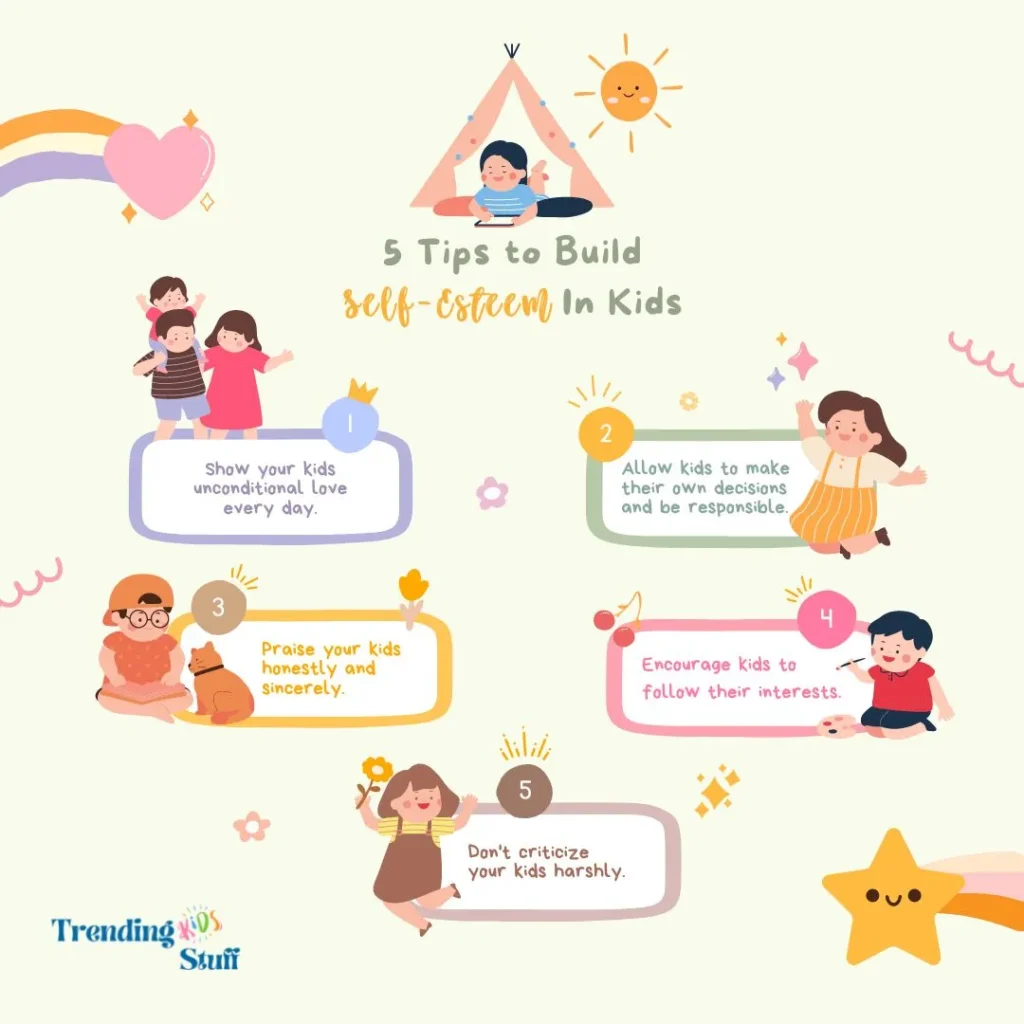Boost Your Child’s Confidence: The Best Self-Esteem Building Activities

As a parent, you understand that your child’s self-esteem is a critical component of their overall well-being. A child with healthy self-esteem is better equipped to navigate life’s challenges and grow into a confident adult. However, not all children are born with high self-esteem, and some may struggle with feelings of inadequacy or self-doubt.
Fortunately, many kid self-esteem-building activities can help your child develop a positive self-image and boost their confidence.
In this article, we will share ten fun and creative activities that can help your child thrive. Whether your child is struggling with their self-esteem or you want to give them an extra boost of confidence, these activities will provide you with the tools and techniques to help your child build a strong and healthy sense of self-worth.
Self-Esteem Building Activities
Creative Self-Expression Will Boost Self-Esteem
Encouraging your child to express themselves creatively is a compelling way to help build their self-esteem. Whether it’s through art, journaling, or imaginative play, creative self-expression helps children gain a deeper understanding of themselves and the world around them.
To encourage creative self-expression, provide your child the tools and support to express themselves creatively. Whether your child loves painting, drawing, sculpting, or writing, give them a safe and encouraging space to create.
Praise and Encouragement
Praise and encouragement are powerful tools that can boost your child’s confidence. However, to make a real impact, it’s important to give effective and meaningful praise that reinforces positive behaviors and attitudes.
When giving praise, focus on your child’s effort, not just their accomplishments, be specific and descriptive in your feedback and encourage your child to praise themselves and others.
Celebrate Achievements
Celebrate all of your child’s achievements, big and small, to send the message that hard work and progress are valuable. Encourage your child to celebrate their successes too, and create a visual reminder of their progress with a sticker chart or display board.
Help Them Set Realistic Goals
Helping your child set specific and achievable goals can help them develop a sense of accomplishment and self-worth. Break down their goals into specific and achievable steps, and help them develop a roadmap to success that will keep them motivated and focused.
Assist Your Child in Setting Attainable Objectives
To begin with, assist your child in setting specific and attainable objectives. When your child has a clear idea of what they want to accomplish, they can better prepare themselves to take the necessary steps to achieve it.
For example, if your child aims to improve their grades, you can help them or establish a specific goal, such as achieving a B on their next math test. By breaking down their objective into specific and realistic steps, your child can create a plan for success that will keep them motivated and focused.
Encourage Your Child to Divide Bigger Objectives into Smaller, Achievable Steps
Encourage your child to break bigger objectives into smaller, more manageable steps. When your child faces a substantial or daunting goal, it can be overwhelming, and easy to get discouraged. By breaking the goal into smaller, more manageable steps, your child can observe progress and build confidence as they achieve each milestone.
For example, if your child desires to learn a new skill, such as playing an instrument, you can help them break down the process into smaller steps, such as learning a new chord each week.
Celebrate Progress Made Toward Objectives, Not Only the End Result
Lastly, celebrate the progress made toward objectives, not solely the result. By recognizing and celebrating the progress your child is making towards their goals, you are helping them establish a sense of accomplishment and pride in their work.
This, in turn, can help them develop a strong sense of self-esteem and self-worth. For example, if your child is working towards enhancing their basketball skills, you can celebrate their progress by acknowledging the hard work they’re putting in and recognizing the improvements they’re making each week.
Moreover, assisting your child in setting realistic goals is an essential aspect of building their self-esteem. By setting specific and attainable goals, dividing larger objectives into manageable steps, and celebrating progress made towards objectives, you can help your child develop a sense of accomplishment and self-worth that comes from achieving their goals.
Remember to encourage your child to dream big but also to take practical steps to turn their dreams into a reality. With your support and encouragement, your child can achieve anything they set their mind to.
Encourage Them to Embrace Their Strengths and Weaknesses
Encouraging your child to embrace their strengths and weaknesses is a crucial part of building their self-esteem. It’s crucial to help your child recognize their strengths and learn how to use them to their advantage, while also acknowledging their weaknesses and working towards improving them. Here are some tips to help your child embrace their strengths and weaknesses.
Help Them Identify Their Strengths and Encourage Them to Utilize Them
Identifying strengths is the first step. As a parent, you can help your child discover their unique talents and abilities. Encourage your child to utilize their strengths in their daily activities and hobbies. For instance, if your child is a good communicator, suggest that they participate in public speaking, debate clubs, or drama classes.
Teach Them That Making Mistakes is Okay and They Can Learn from Them
Mistakes are an inevitable part of life, but it’s essential to teach your child that they can learn from them.
Help your child to see their mistakes as an opportunity to grow and learn. Encourage your child to take risks and try new things, even if they’re not confident in their abilities. When they make mistakes, help your child reflect on what they learned from the experience.
Encourage Them to Ask for Help When Needed
Encouraging your child to ask for help when needed is a valuable skill that they will carry with them throughout their lives. Nobody is perfect, and it’s essential to teach your child that asking for help is not a sign of weakness but a sign of strength. Help your child learn when to ask for help, who to ask, and how to ask for it.
Embracing strengths and weaknesses is vital for building your child’s self-esteem. By helping your child identify their strengths, learn from mistakes, and ask for help when needed, you can teach your child how to develop a healthy self-image and a growth mindset.
Encourage your child to be compassionate and patient with themselves and others as they embrace their strengths and work on improving their weaknesses. With your guidance and support, your child can achieve anything they set their minds to.
Encouraging Positive Relationships for Your Child’s Self-Esteem
As a parent, you play a vital role in building your child’s self-esteem. Developing healthy relationships is a crucial component of this process, and it’s essential to model the behavior you want to encourage in your child. Here are some activities to build children’s confidence and build self-esteem.
Encourage Your Child to Spend Time with Positive People
Encourage your child to spend time with people who inspire, uplift, and support them. Help them identify positive role models in their lives and encourage them to spend time with people who have similar interests and values.
Surrounding your child with positive influences can help them develop a strong sense of self-worth. Create a positive affirmation to reframe negative thoughts.
Teach Your Child Social Skills
Teaching your child social skills is another way to help them build healthy relationships. Encourage your child to practice active listening, communication, conflict resolution, and empathy. By modeling these skills, you can help your child develop a deep understanding of themselves and others.
Teach Your Child to Be Kind and Respectful
Teach your child to be kind, empathetic, and respectful towards others. Emphasize the importance of treating others the way they want to be treated. Encourage your child to see the good in others, even if they don’t always agree with them. By teaching your child to be a positive influence on others, you can help them develop a sense of self-worth and self-confidence.
Model Healthy Self-Esteem
As a parent, you are the most influential role model in your child’s life. Show your child that you value yourself and others by modeling healthy self-esteem. By treating yourself and others with respect and compassion, you can help your child develop a healthy sense of self-worth and self-esteem.
activities to build self-confidence in a child
Encourage Physical Activity
Physical activity is an essential component of building a child’s self-esteem. Here are some ways to help your child stay physically active, explore new activities, and celebrate their achievements.

Encourage Your Child to Be Physically Active
Encourage your child to participate in physical activities they enjoy, whether it’s playing sports, dancing, hiking, or just playing in the park. Physical activity can help your child feel good about themselves and develop a positive self-image.
Supporting Your Child in Trying New Physical Activities
Encouraging your child to try new physical activities that challenge them is crucial for building their self-esteem. Although it can be daunting, supporting your child in trying new things can help them develop the confidence to take on new challenges and acquire new skills.
Celebrating Your Child’s Progress and Achievements in Physical Activities
Acknowledging your child’s progress and achievements in physical activities, whether they improve their time in a race, learn a new dance move, or enjoy being active, can boost their self-worth and make them feel proud of themselves.
Boosting Self-Confidence Through Competence
Self-confidence is an essential component of building your child’s self-esteem, and competence plays a significant role in this. When your child feels competent in their abilities, they are more likely to have a positive view of themselves. Here are some ways to help your child build their confidence through competence.
Cultivating Your Child’s Interests
Encourage your child to develop their skills and abilities in areas they are passionate about. By pursuing their interests, your child can develop their strengths and gain confidence in their abilities. Encourage them to explore new things and support them in pursuing their passions.
Encouraging Your Child to Take Risks
Taking risks can help your child build confidence and develop resilience. Encourage your child to try new things, take risks, and step out of their comfort zone, such as trying a new sport, learning a new skill, or making a new friend.
Celebrating Your Child’s Progress and Achievements
Celebrating your child’s progress and achievements in developing new skills is vital. Whether your child masters a new skill or overcomes a challenge, celebrating their progress and acknowledging their efforts can boost their self-esteem and make them feel proud of themselves.
Remember, building competence is a powerful way to boost your child’s self-confidence and help them develop a strong sense of self-worth. By cultivating their interests, encouraging them to take risks, and celebrating their progress and achievements, you can help your child thrive in all areas of their lives.

The Power of Imaginative Play
Imaginative play is one of the most potent ways to tap into your child’s creativity and problem-solving skills. Here are some tips for using imaginative play to boost your child’s self-esteem.
Unlocking Your Child’s Creativity
Encourage your child to engage in imaginative play, whether it’s playing with dolls, building with blocks, or creating games. Imaginative play allows your child to explore new ideas and concepts, develop their social skills, and build their confidence and self-esteem.
Problem-Solving Through Role Play
Role-play can help your child develop problem-solving skills. Whether they’re pretending to be a doctor, a teacher, or a superhero, role-play allows children to work through real-life situations and develop problem-solving skills in a safe and supportive environment.
Fostering Creativity and Innovation
Encourage your child to use their imagination to come up with new ideas and solutions, such as building a fort out of blankets or creating a new game to play with their friends. Fostering creativity and innovation can help them develop confidence in their abilities and build a strong sense of self-worth.
Conclusion:
Nurturing self-esteem is a crucial aspect of helping your child cultivate a positive self-image and a healthy sense of self-worth so they feel confident in their place in this world.
By incorporating some of the self-esteem activities for kids outlined in this article, you can assist your child in feeling more confident and capable in all areas of their life. Remember to be patient, consistent, and supportive, and your child will be well on their way to building a strong sense of self-esteem.








